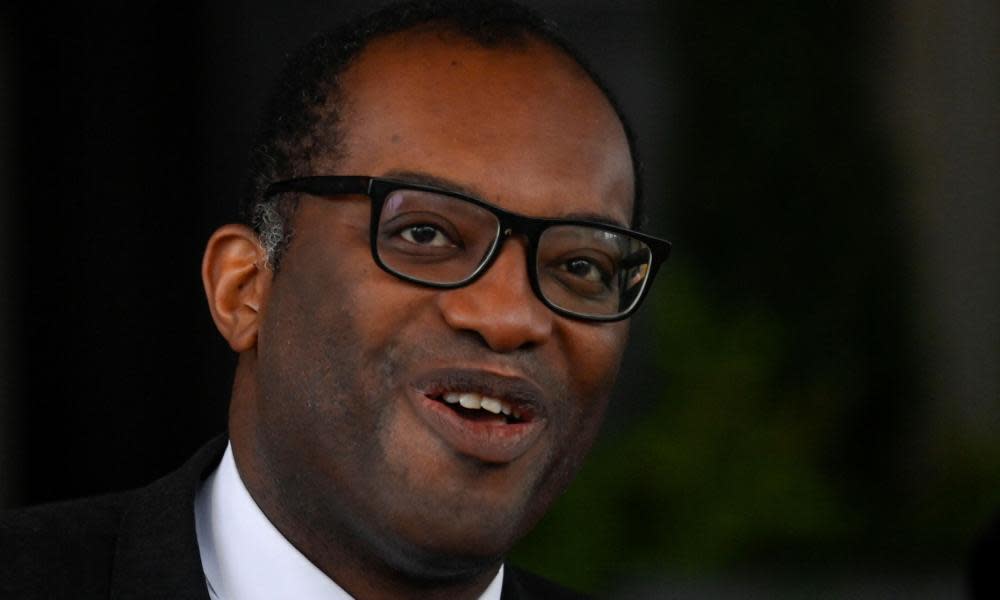Kwarteng IEA fringe event hints at how deeply thinktank is embedded in No 10

Kwasi Kwarteng’s longest public appearance at the Conservative party conference will not be on the main stage, where he spoke for 20 minutes on Monday, but at a fringe event hosted by two thinktanks on Tuesday afternoon.
For an hour, the “person responsible for the UK’s economic future”, as the event bills it, will outline his vision in a conversation with the TaxPayers’ Alliance and the Institute of Economic Affairs (IEA). It will be longer than his 25-minute “mini-budget” speech and his “quarter of an hour – or maybe a bit longer” with party donors after the mini-budget.
Related: Liz Truss refuses to commit to raising benefits in line with inflation – UK politics live
Mark Littlewood, the director general of the IEA, will be one of Kwarteng’s interviewers, speaking to the man responsible for implementing “Trussonomics”. The IEA has faced criticism over a lack of transparency over its donors, and a 2019 Guardian investigation found it had historically issued publications arguing climate change is either not significantly driven by human activity or will be positive.
Littlewood has known Truss for more than 25 years since they met at Oxford, members of the Oxford Reform Club, a “non-partisan group but probably a bit Lib Dem-y, a bit remainy”, as Littlewood described it in a video for the IEA.
Contemporaries at the Reform Club included Olly Robbins, later Theresa May’s Europe adviser. Andy Mayer, the chief operating officer at the IEA, was “but a humble grunt” when he met Truss for the first time in the mid-90s, who was then vice-president of the club.
“It was a lot of bright people who wanted to be modernisers before modernisation was a thing under Blair. Principally one nation Conservatives, New Labourites, Liberal Democrats,” Mayer said. “Many of the people involved in it cheered the result of the 1997 election,” he added.
Truss’s route from the Lib Dems to the Conservatives, Mayer suggests, was via the Hayek Society at Oxford University. “By the time she’s standing to be a Conservative MP, she’s already been deep in free market theory for some years.”
Another lapsed Liberal Democrat-turned-Tory suggested such conversions were not a case of their views changing, but the parties changing: the social conservatism of the Conservative party reforming to adopt more social liberalism that dovetailed with economic liberal views, while the Liberal Democrats shifted away from Orange Book economic liberalism towards social democratic values.
Then in 2011, Truss set up the Free Enterprise Group of Tory MPs with the help of Ruth Porter, the IEA’s then communications director, Littlewood, and the IEA.
Littlewood told the Times: “The IEA could print documents for them, host dinners for them and all the rest of it. They got to know each other better, they got to know us better and they produced short pamphlets on free market thinking.”
By 2012, Kwarteng chaired the Free Enterprise Group. As well as writing Britannia Unchained with Truss, Dominic Raab, Priti Patel and Chris Skidmore, Kwarteng edited A Time For Choosing in 2015 with the IEA’s then head of public policy, Ryan Bourne.
Among the proposals in the Free Enterprise Manifesto is to “stop relying so heavily on fundamentally uncertain official forecasts”.
Now, Porter is deputy to Downing Street’s chief of staff, Mark Fullbrook. The economist Patrick Minford, who has advised Truss, is a trustee of the IEA. The special advisers Radomir Tylecote and Victoria Hewson are also IEA alumni.
So, is this the most IEA government we’ve had? “I think it’s a lovely talking point, but it’s clearly not true,” Mayer says, citing Margaret Thatcher’s government instead. As for if it was the Free Enterprise Group, the IEA, or the Reform Club that shaped Truss the most, he is unsure.
While the former Lib Dem activist backed remain in the EU referendum, Littlewood suggests in his video that Truss’s shift to wholehearted support of Brexit after the result was not a fundamental change: “Liz Truss is a free marketeer from head to toe.”
But after the 45p U-turn, Littlewood told Radio 4’s Today: “You always worry about that when you see a U-turn ... I’ve known Liz Truss for many years and I can’t think of another time where she’s changed her mind on anything, anything at all.”
Another view from Mayer was that “the consistent part of Liz’s politics, that’s very important to why she’s ended up where she is, is her loyalty. She’s fiercely loyal to the leaders of her party. That has served her well, and is why she won that leadership contest.”
Whether her MPs share such a view remains unclear.

 Yahoo Movies
Yahoo Movies 
